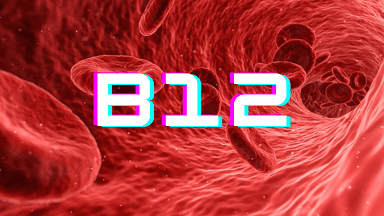Here are 9 vitamin B12 deficiency symptoms you should never ignore

Vitamin B12 is an essential nutrient that our bodies need to be healthy. It’s responsible for making red blood cells, nerves, and DNA in addition to carrying out other essential functions.
The thing is, we can’t produce B12 on our own like most other vitamins; we need to consume it. On average, a healthy adult must ingest at least 2.4 micrograms of B12 each day.
However, some people don’t consume enough B12-rich food or supplements, and others are unable to absorb enough B12 no matter how much they take in; the result is that many people develop B12 deficiencies, and you might be one of them (plus as you grow older you’ll become progressively susceptible to vitamin deficiencies).
It is estimated that 20 percent of people over 50 are in a state of inadequate vitamin B12 reserves. Unfortunately, it is far from unusual for people to ignore the symptoms. This is partly because there are quite a few different signs which have aspects in common with other conditions as well.
Check the following signs to see if you have any of them, so that you can fix any vitamin B12 deficiency that you may unknowingly have.
Weakness and Fatigue
Feeling exhausted and weak is one of the vitamin B12 deficiency’s most prevalent symptoms.
Lack of vitamin B12 impairs the body’s ability to carry oxygen since it is required for the creation of red blood cells. This type of weakening of your oxygen transport system is typically brought on by the inflammatory disease pernicious anemia. This kind of anemia develops because the body is unable to manufacture enough intrinsic factor, which the intestines need to absorb vitamin B12 properly.
For vital bodily and mental processes, vitamin B12 is required.
Mental Issues
Your mental well-being depends on it, and vitamin B12 deficiency has been related to mood disorders including anxiety and sadness. This is due to the fact that vitamin B12 is required for the production of neurotransmitters like serotonin and dopamine, which are in charge of mood control and appropriate brain function.
Depression is probable when these chemical levels are low. It has also been demonstrated that vitamin B12 deficiency lowers brain oxygen levels. A lack of oxygen in the neurons prevents them from sending messages to the body’s other tissues, which can alter mood.
Pins and Needles, Numbness
Nerve damage is the most serious side effect of B12 deficiencies over time. A lack of B12 causes reduced production of myelin, which makes up the protective sheath around the nerves, with exposed or weak nerves.
The body may experience paresthesia, which is a pins and needles sensation throughout the arms hands, legs or feet. Numbness or limbs that fall asleep is also common. These symptoms of vitamin B12 deficiency typically occur in conjunction with anemia mobility issues.
If a vitamin b12 deficiency goes untreated, the nerves may deteriorate to a point where your mobility is challenged. Your ability to move or your walking style may change, and you may find that your balance and coordination are off. This symptom is most common in the elderly, and it raises concerns about accidents such as falling.
Although people over the age of 60 are more likely to experience a B12 deficiency, young people with a severe deficiency may also show these symptoms.
Dizziness and Shortness of Breath
Frequent vertigo or dizziness are also symptoms of a vitamin B12 deficiency. These signs occur most often when suddenly changing positions like standing up after sitting or lying down or immediately after strenuous physical activity.
Again, this happens because the body is short of red blood cells and without adequate oxygen. The cells in your body cannot perform their functions effectively.
Blurry Vision.

If you have a B12 deficiency, you might also experience blurry or distorted vision. This symptom is more common when the deficiency progresses into nerve damage once it affects the optic nerve, which is responsible for connecting the eyes to the brain.
Signals cannot travel effectively and disturbed vision occurs, although some overlook vision, deterioration as a part of life, it may be the result of a preventable vitamin B12 deficiency,
Paleness or Jaundice.
People with a vitamin B12 deficiency often appear pale or even slightly. Yellow jaundice is a condition that affects the skin and eyes producing this yellow tinge.
Megaloblastic anemia causes the red blood cells in the bone marrow to become enlarged and fragile. As a result, they can’t pass out of the marrow and into circulation. So this entire supply of red blood cells becomes useless to the body.
The subsequent shortage causes paleness and because these cells are so fragile, they often break down and create an excess of bilirubin, the yellow chemical compound responsible for jaundice
Swollen Red Tongue.
Glossitis is an early sign of a vitamin B12 deficiency and it causes inflammation of the tongue. You may notice lesions redness, swelling or pain once your tongue changes its shape and color, you may struggle to speak and eat.
In addition to these unpleasant symptoms, a vitamin B12 deficiency can also cause other oral issues such as mouth ulcers, pins and needles in the tongue and a burning or itching sensation around the mouth.
Skin Hair and Nail Problems.

Vitamin B12 is also essential for healthy skin, hair and nails, and if your B12 intake is low, you might notice their decline. One possible symptom is vitiligo, a pigmentation disorder that causes white patches on the skin.
Other skin issues include acne dermatitis, hyper-pigmentation and skin lesions. Low levels of B12 can also cause hair loss, prematurely, gray, hair and brown gray nails
Digestive Issues and a Decreased Appetite.
Low levels of B12 can also be linked to problems in the digestive tract. Symptoms include nausea, vomiting, heartburn, abdominal bloating gas, constipation and diarrhea with an upset, stomach or recurring diarrhea.
You might feel weak and lose your appetite in the long run. This could lead to unhealthy weight loss.
Conclusion
An expert doctor may be able to identify the signs of a vitamin B12 shortage right immediately when you speak with them. To confirm and correctly diagnose the problem, you will require a blood test. It is a good idea to discuss your B12 levels with your doctor.
Early detection and treatment are crucial for vitamin B12 deficiencies because left untreated, they can have serious effects like neuropathy.
If you experience any of the symptoms listed or you follow a lifestyle that makes you susceptible to certain vitamin deficiencies, for example, if you keep to a vegan or vegetarian diet, underwent weight loss surgery, or have a condition that prevents you from absorbing nutrients, such as colitis, Crohn’s disease, irritable bowel syndrome (IBS), or celiac disease, early detection and treatments are available.
Have you ever had a deficiency of vitamin B12?
How did you learn about your disease, and what actions did you take to treat it?
